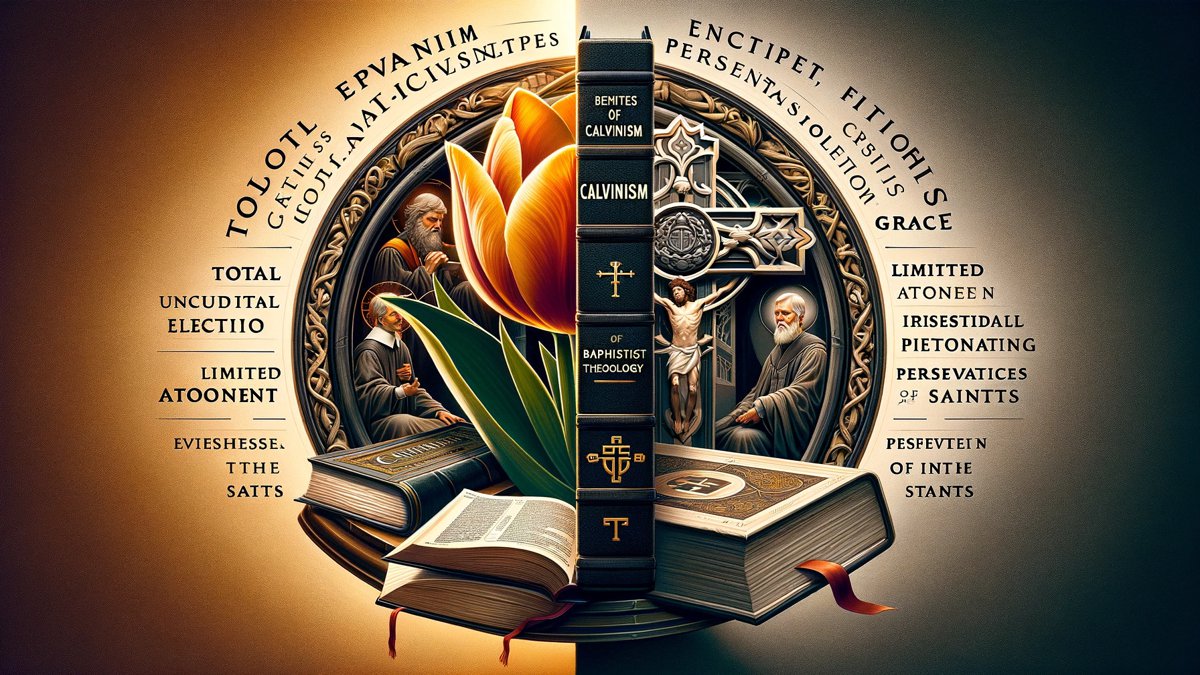Home>Theology and Spirituality>What Is Calvinism Vs Baptist


Theology and Spirituality
What Is Calvinism Vs Baptist
Published: February 20, 2024
Ericka Andersen, an editor at Christian.net, expertly merges digital strategy with content creation, focusing on faith and societal issues. Her communication skills enhance the platform's engaging narratives, fostering meaningful dialogue on belief's impact on society.
Discover the key differences between Calvinism and Baptist theology and spirituality. Explore their beliefs and practices to deepen your understanding.
(Many of the links in this article redirect to a specific reviewed product. Your purchase of these products through affiliate links helps to generate commission for Christian.net, at no extra cost. Learn more)
Table of Contents
Introduction
Calvinism and Baptist are two significant theological traditions within Christianity, each with its own distinct beliefs and practices. Understanding the differences and similarities between these two traditions is essential for anyone seeking to comprehend the diverse landscape of Christian theology.
In this article, we will delve into the historical origins, core beliefs, and key differences between Calvinism and Baptist. By exploring the theological underpinnings of these traditions, we aim to provide a comprehensive overview that sheds light on their unique perspectives on faith, salvation, and the nature of God.
Through this exploration, readers will gain valuable insights into the theological nuances that have shaped these traditions over the centuries. Whether you are a student of theology, a curious seeker, or simply interested in understanding the rich tapestry of Christian thought, this exploration of Calvinism and Baptist will offer a deeper understanding of the diverse theological landscape within Christianity.
History of Calvinism
Calvinism traces its roots to the Protestant Reformation of the 16th century, a period marked by profound theological and ecclesiastical upheaval. The movement takes its name from John Calvin, a French theologian and pastor who played a pivotal role in shaping its doctrinal foundations.
The origins of Calvinism can be found in Geneva, Switzerland, where John Calvin established a theocratic community based on his interpretation of biblical teachings. Calvin's magnum opus, "Institutes of the Christian Religion," served as a comprehensive exposition of his theological framework, solidifying his influence on the development of Calvinism.
One of the defining features of Calvinism is its adherence to the doctrines of grace, encapsulated in the acronym TULIP: Total depravity, Unconditional election, Limited atonement, Irresistible grace, and Perseverance of the saints. These tenets, often associated with the Reformed tradition, reflect Calvin's emphasis on the sovereignty of God in salvation and the utter dependence of humanity on divine grace.
Calvinism gained traction beyond Geneva, spreading to various European regions and influencing theological discourse across Protestant denominations. The Synod of Dort in the Netherlands (1618-1619) further solidified Calvinist theology, addressing doctrinal disputes and affirming the five points of Calvinism in response to Arminianism.
The impact of Calvinism extended beyond theological realms, shaping social, political, and economic landscapes in regions where it took root. The doctrine of predestination, a central tenet of Calvinism, influenced perceptions of individual agency and contributed to the development of a Protestant work ethic, particularly in Calvinist-influenced areas such as the Netherlands, Scotland, and parts of North America.
In the centuries following its emergence, Calvinism underwent diverse expressions and adaptations, giving rise to various denominational traditions, including Presbyterianism, Congregationalism, and Reformed churches. Today, Calvinist theology continues to exert a profound influence on Christian thought and remains a vibrant theological tradition within Protestantism.
The historical trajectory of Calvinism reflects its enduring impact on the theological, cultural, and intellectual landscapes of Christianity, underscoring the significance of its origins in the Protestant Reformation and the enduring legacy of John Calvin's theological legacy.
History of Baptist
The history of the Baptist tradition is characterized by a rich tapestry of theological diversity and a commitment to principles such as believer's baptism, congregational governance, and religious liberty. The roots of the Baptist movement can be traced back to the 17th century, amidst the backdrop of the English Reformation and the broader Protestant upheaval in Europe.
One of the defining moments in Baptist history is linked to the emergence of dissenting groups within English Puritanism. Individuals such as John Smyth and Thomas Helwys, disillusioned with the state-controlled Church of England, sought to establish a community of believers based on voluntary association and the autonomy of local congregations. This pursuit of religious freedom and a return to New Testament principles laid the groundwork for the development of Baptist identity.
In 1609, John Smyth, along with a group of like-minded believers, conducted believer's baptism by immersion, marking a significant departure from infant baptism practices prevalent in both the Catholic and Protestant traditions. This act symbolized a commitment to a voluntary, covenanted community of baptized believers, a hallmark of Baptist ecclesiology.
The early decades of the Baptist movement were marked by persecution and marginalization, as dissenting groups faced opposition from both the established church and civil authorities. Despite these challenges, the Baptist tradition continued to grow and diversify, with various strands such as General Baptists and Particular Baptists emerging in England, each espousing distinct theological emphases.
The 17th century also witnessed the spread of Baptist ideas to the American colonies, where figures like Roger Williams and John Clarke championed principles of religious freedom and the separation of church and state. The Rhode Island colony, founded on the basis of religious liberty, became a refuge for religious minorities, including Baptists, who sought to practice their faith without interference from governmental authorities.
Over the centuries, the Baptist tradition has evolved into a global movement, encompassing a spectrum of theological perspectives, worship styles, and denominational affiliations. From the establishment of the Southern Baptist Convention in the United States to the growth of Baptist communities in Africa, Asia, and beyond, the history of the Baptist tradition reflects its adaptability and resilience in diverse cultural and geographical contexts.
Today, the Baptist tradition continues to embody a commitment to soul freedom, the priesthood of all believers, and the autonomy of the local church. Its historical journey, marked by challenges, triumphs, and theological diversity, underscores the enduring impact of the Baptist movement within the broader landscape of Christian faith and practice.
Beliefs of Calvinism
Calvinism, rooted in the theological insights of John Calvin, encompasses a robust doctrinal framework that has profoundly shaped Protestant theology. At the core of Calvinist beliefs lie the doctrines of grace, which articulate the sovereignty of God in salvation and the radical depravity of humanity. These beliefs are encapsulated in the acronym TULIP, serving as a mnemonic device for the five key tenets of Calvinism.
-
Total Depravity: Calvinism asserts the pervasive and profound nature of human depravity, emphasizing that the fall has affected every aspect of human existence. This doctrine stands in stark contrast to the notion of human ability to initiate salvation apart from divine intervention.
-
Unconditional Election: Central to Calvinist theology is the concept of unconditional election, which underscores God's sovereign choice in predestining individuals for salvation. This belief emphasizes that God's election is not contingent upon foreseen faith or merit but is rooted solely in His sovereign will.
-
Limited Atonement: Also known as particular redemption, this doctrine maintains that Christ's atoning work on the cross is specifically intended for the elect, ensuring the efficaciousness of His sacrifice for those whom God has chosen for salvation.
-
Irresistible Grace: Calvinism affirms the irresistibility of God's grace in the process of salvation, asserting that those whom God has elected cannot ultimately resist the call of divine grace. This belief underscores the efficacious nature of God's saving work in the lives of the elect.
-
Perseverance of the Saints: Often referred to as the preservation of the saints, this doctrine emphasizes the certainty of God's preservation of the elect, ensuring that those who are truly regenerated will persevere in faith until the end. This belief provides assurance of the eternal security of the redeemed.
These foundational beliefs of Calvinism reflect a robust emphasis on the sovereignty of God in every aspect of salvation, from the initial calling of the elect to their ultimate preservation. The theological coherence of Calvinist beliefs has engendered profound discussions and debates within Christian theology, shaping the contours of Reformed thought and its influence on broader Protestant traditions.
Beliefs of Baptist
The Baptist tradition is characterized by a set of core beliefs that have shaped its theological identity and ecclesiastical practices. At the heart of Baptist theology lie principles such as soul freedom, believer's baptism, congregational autonomy, and the priesthood of all believers. These beliefs, rooted in New Testament teachings and historical developments, have contributed to the distinctiveness of the Baptist tradition within the broader landscape of Christian faith.
Soul Freedom
Central to Baptist beliefs is the concept of soul freedom, which emphasizes the individual's autonomy in matters of faith and conscience. This principle underscores the right of every person to approach God directly, free from coercion or external authority. Soul freedom aligns with the Baptist commitment to religious liberty and the rejection of religious compulsion, reflecting a deep respect for the individual's spiritual journey and personal relationship with God.
Believer's Baptism
A hallmark of Baptist theology is the practice of believer's baptism by immersion, symbolizing the believer's identification with Christ's death, burial, and resurrection. This distinctive form of baptism signifies a voluntary, public declaration of faith and marks the individual's entrance into the community of believers. Believer's baptism, rooted in the New Testament model of baptism, distinguishes Baptist theology from infant baptism practices prevalent in other Christian traditions.
Congregational Autonomy
Baptist churches adhere to the principle of congregational autonomy, affirming the independence of local church bodies in matters of governance and decision-making. This belief underscores the authority of the local congregation in spiritual and administrative affairs, reflecting a commitment to democratic processes and the active participation of church members in the life of the community.
Priesthood of All Believers
The Baptist tradition upholds the priesthood of all believers, emphasizing the direct access of every believer to God and the responsibility of all members to engage in the ministry and mission of the church. This belief rejects hierarchical distinctions within the body of Christ, affirming the spiritual equality and shared responsibility of all believers in the life and work of the church.
Religious Liberty
Baptists have been staunch advocates of religious liberty, championing the freedom of conscience and the separation of church and state. Throughout history, Baptist communities have been at the forefront of movements advocating for religious freedom, contributing to the development of principles enshrined in constitutional protections and international declarations of human rights.
These core beliefs of the Baptist tradition reflect a commitment to foundational principles such as individual autonomy, scriptural fidelity, and the priesthood of all believers. They have shaped the theological distinctiveness and ecclesiastical practices of Baptist communities worldwide, underscoring the enduring impact of Baptist beliefs within the broader tapestry of Christian faith and practice.
Comparison of Calvinism and Baptist
Calvinism and Baptist, while both rooted in the Protestant Reformation and sharing certain theological affinities, exhibit distinct doctrinal emphases and ecclesiastical practices that set them apart within the spectrum of Christian traditions.
Theological Emphases
Calvinism places a strong emphasis on the sovereignty of God in salvation, highlighting the doctrines of grace as articulated in the TULIP framework. The Calvinist understanding of predestination and divine election underscores the absolute authority of God in determining the eternal destiny of individuals. In contrast, Baptist theology upholds the principles of soul freedom and believer's baptism, emphasizing the autonomy of the individual in matters of faith and the voluntary nature of baptism as a public expression of personal faith.
Views on Salvation
Calvinism espouses a robust doctrine of unconditional election and irresistible grace, affirming God's sovereign initiative in the salvation of the elect. The Calvinist understanding of limited atonement underscores the particularity of Christ's redemptive work for the elect. On the other hand, Baptist theology emphasizes believer's baptism as a symbolic act of identification with Christ and a public testimony of faith. The Baptist tradition underscores the voluntary nature of faith and the believer's active response to the gospel message.
Read more: How Are Calvinism And Catholicism Different
Ecclesiastical Governance
Calvinism has historically been associated with Presbyterian and Reformed ecclesiastical structures, characterized by a strong emphasis on elder rule and the oversight of church governance by elected bodies of elders. In contrast, Baptist churches adhere to congregational autonomy, affirming the independence of local church bodies in matters of governance and decision-making. The Baptist commitment to congregational polity reflects a democratic ethos and the active participation of church members in the life and decision-making processes of the community.
Perspectives on Religious Liberty
Both Calvinism and Baptist have played significant roles in advocating for religious liberty and the separation of church and state. While Calvinism has been influential in shaping the Reformed tradition's approach to societal engagement and the relationship between church and state, Baptist communities have been staunch advocates of religious freedom, contributing to the development of principles enshrined in constitutional protections and international declarations of human rights.
In essence, while Calvinism and Baptist share common historical roots in the Protestant Reformation and a commitment to foundational Christian doctrines, their distinct theological emphases, views on salvation, ecclesiastical governance, and perspectives on religious liberty underscore the unique contributions of each tradition to the rich tapestry of Christian thought and practice.
Conclusion
In conclusion, the exploration of Calvinism and Baptist reveals the rich tapestry of theological diversity within the broader landscape of Christian traditions. The historical origins, core beliefs, and distinct emphases of these two traditions underscore the enduring impact of the Protestant Reformation and the subsequent theological developments that have shaped their identities.
Calvinism, with its emphasis on the sovereignty of God in salvation and the doctrines of grace encapsulated in the TULIP framework, reflects a robust theological framework that has profoundly influenced Protestant thought. The enduring legacy of John Calvin and the theological coherence of Calvinist beliefs continue to shape the contours of Reformed theology and its impact on broader Protestant traditions.
On the other hand, the Baptist tradition, characterized by core principles such as soul freedom, believer's baptism, congregational autonomy, and the priesthood of all believers, embodies a commitment to individual autonomy, scriptural fidelity, and the democratic governance of local church bodies. The historical journey of the Baptist movement, marked by a steadfast commitment to religious liberty and the separation of church and state, underscores its enduring impact on the global landscape of Christian faith and practice.
While Calvinism and Baptist exhibit distinct theological emphases, views on salvation, ecclesiastical governance, and perspectives on religious liberty, they both contribute to the rich tapestry of Christian thought and practice. Their historical trajectories, theological distinctiveness, and enduring legacies underscore the diverse expressions of faith within the broader Protestant tradition.
By delving into the historical roots and doctrinal foundations of Calvinism and Baptist, we gain valuable insights into the theological nuances that have shaped these traditions over the centuries. Whether one resonates more with the sovereignty of God in salvation or the autonomy of the individual believer, the exploration of Calvinism and Baptist offers a deeper understanding of the diverse theological landscape within Christianity.
Ultimately, the theological richness and diversity represented by Calvinism and Baptist serve as a testament to the enduring vitality of Christian faith and the myriad ways in which individuals and communities have sought to understand and live out their beliefs. As we continue to engage with the theological heritage of these traditions, we are reminded of the profound impact of historical developments and doctrinal distinctiveness on the ongoing conversations within Christian theology.












